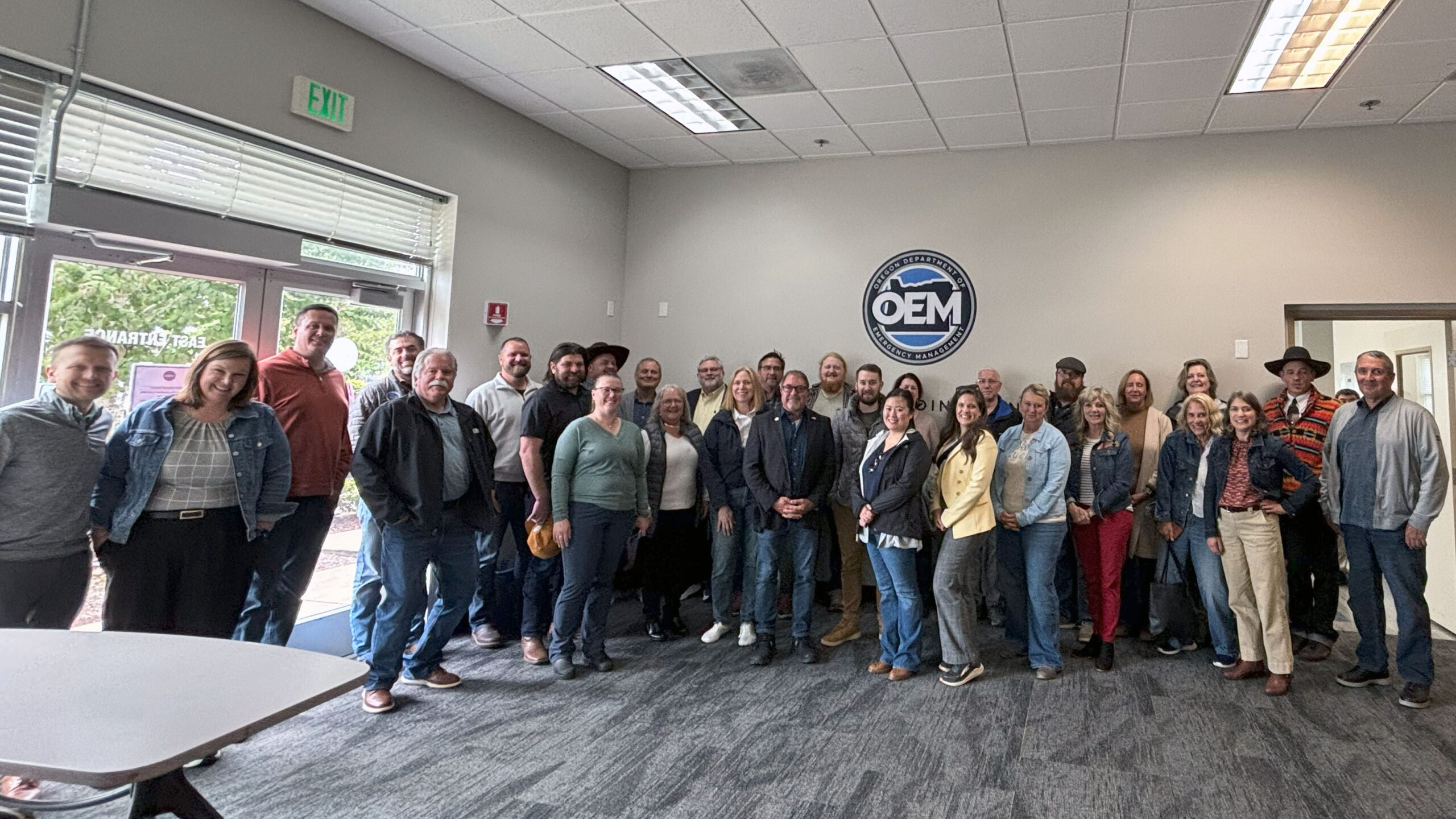
Jun 2, 2025 | AOC Advocacy
The “second chamber deadline” for the 2025 Legislative Session passed on Friday, May 23, at 5 p.m. Bills must have been voted out of the second chamber policy committee in order to continue moving through the legislative process toward becoming law. Nearly all of the Association of Oregon Counties’ (AOC) priority bills are advancing or are in committees not subject to this deadline. Most of the bills opposed by AOC have been amended to mitigate our concerns or will not move forward this session.
As the Legislature prepares its balanced biennial budget, policy bills with a fiscal component requiring state general fund allocations are sent to the Joint Committee on Ways and Means. If the budget writers intend to fund those policy bills, they will be referred to the appropriate subcommittee for further consideration before being heard in the full joint committee. Bills must pass both the House and Senate before the legislative assembly adjourns “sine die” – Latin for “without a day.” The presiding officers have identified Wednesday, June 18, as “target sine die,” and Sunday, June 29, is “constitutional sine die.”
Below are updates on AOC’s 2025 session priorities and bills on which we have been actively engaged. A comprehensive bill list is available on AOC’s Legislative Committee Website and is regularly updated throughout the session.
May Revenue Forecast
The latest revenue forecast was presented to the Legislature by state economists on Wednesday, May 14. As some expected, projected revenues available for the 2025-2027 biennium were revised downward from last quarter – due to a reduction in both revenue and resources – resulting in $755 million less than previously expected for the Legislature to allocate. However, the state’s kicker rebate has also been reduced to $1.6 billion providing a net General Fund balance of $35.7 billion. Paired with an additional $5.3 billion from lottery revenues, recreational marijuana excise tax, and Corporate Activity Tax, Oregon stands with just over $41 billion in total available funds, plus a 10.6% emergency reserve. Given Governor Kotek’s proposed 2025-2027 budget recommending $39.3 billion in funding, Oregon is in a reasonable position compared to our neighboring states to continue providing existing public services.
AOC 2025 Session Priorities Status Updates
Assessment and Taxation Funding
Ongoing conversations and negotiations with stakeholders and members of the House Committee on Revenue are taking place around AOC’s assessment and taxation funding proposal, House Bill 3518. AOC anticipates a final informational hearing in the House Committees on Revenue in the coming weeks and remains optimistic that a solution will move forward this session.
Community Corrections and Deflection Funding
The April corrections population forecast showed a substantial decline in the projected population for individuals on community supervision. This is both good and bad news. The baseline budget is substantially smaller, and the cost study is more affordable. However, because funding is allocated per person, it becomes even more critical to fully fund the study. Unfortunately, the Oregon Department of Corrections budget passed out of the Way and Means Subcommittee on Public Safety at the current service level amount, which is substantially lower than the governor’s request and does not incorporate any of the cost study.
AOC’s county deflection program cost survey yielded a statewide ask of $47 million, which is $7 million more than the governor’s recommended budget. The Criminal Justice Commission recently presented 2024 program results, current data as of April 2025, and evidence-backed best practices to the Ways and Means Subcommittee on Public Safety. AOC continues to be engaged with the budget writers, urging them to fully fund these integral public safety measures.
Health and Human Services
AOC is advocating for funding to meet counties’ statutory obligations for behavioral health, public health, and intellectual and developmental disabilities services; adequate statewide funding for effective deflection programs; and maintenance of homelessness response infrastructure and local coordination.
Senate Bill 610A, which improves transparency and coordination of Behavioral Health Resource Network grantmaking with the local behavioral health system passed out of the House this past Thursday and is on its way to be signed by the governor.
AOC’s remaining public health priorities including funding for Community Mental Health Programs, Oregon Health Authority residential treatment study, expanded substance use disorder prevention and treatment capacity, and local healthcare workforce development await action in Ways and Means.
State Forest Harvest Revenue
House Bill 3103A would require a sustainable harvest in the state forests, which in turn will provide a level of budgetary certainty for the 15 Trust Land Counties. The bill was moved to Joint Ways and Means for fiscal consideration following the May revenue forecast. Oregon Forest Industries Council, Special Districts Association of Oregon, Oregon School Boards Association, Coalition of Oregon School Administrators, and the Oregon Education Association have all leaned in to support this measure and urge its passage.
Transient Lodging Tax Flexibility
House Bill 3962-2 extends the permissible uses of net revenue from a new or increased local transient lodging tax to include public safety services and certain costs related to community infrastructure. HB 3962-2 received a hearing in the House Committee on Revenue on May 8, and remains active. AOC continues to provide support to legislators through ongoing negotiations.
Transportation Funding Package
Hearings on the 2025 transportation package moved to the newly created Joint Committee on Transportation Reinvestment. Membership of the committee is the same as the regular Joint Committee on Transportation, but it is not subject to deadlines, meaning a final package can be introduced, debated, and moved out of the committee up to the final days of session.
As this conversation and negotiation evolves, AOC staff will continue to advocate for the principles and priorities set by our Legislative Committee.
Tyler v. Hennepin Foreclosure Surplus Alignment
House Bill 2089 provides for a process by which former owners of real property deeded to the county for delinquent property taxes may claim the surplus value after the property has been sold by the county. This brings Oregon into alignment with the U.S. Supreme Court’s decision in Tyler v. Hennepin County. AOC has been negotiating on this issue since early 2024 to mitigate many of the operational and financial burdens that the Supreme Court decision and early versions of HB 2089 would have created. A work session has been scheduled for Tuesday, June 3, to consider a final negotiated amendment.
Water
All of AOC’s priority water bills, including place-based water planning, were referred to the Joint Committee on Ways and Means for further consideration.
Wildfire
After successfully passing through its first policy committee, House Bill 3940, one of the Wildfire Funding Workgroup bills, was heard in May in the House Committee on Revenue. The AOC Legislative Committee voted to support Sec. 6-44 (programmatic changes that will save public and private landowners money going forward) at the May meeting. With AOC now officially in support, there will be greater leverage in negotiations as all members of the workgroup are united in ensuring there is fair and consistent funding to fight wildfires in Oregon.
Wolf Depredation Grants
Senate Bill 777A makes a series of changes to the Wolf Depredation and Compensation Grant Program housed at the Oregon Department of Agriculture – a longtime priority of AOC. Counties took the lead on the wolf depredation legislative concept, which will help bring additional deterrence to the landscape and more ranchers into the program. After over a decade of failed attempts at updates to the program, SB 777 passed out of the Senate with a strong 28-1 floor vote. The bill unanimously passed out of the House Agriculture Committee and is slated for a House floor vote the first week of June.

Jun 2, 2025 | AOC News
County leaders from across Oregon came together in May for the fourth session of County College, a program by the Association of Oregon Counties (AOC) designed to equip new county leaders with training on governance, roles, and responsibilities.
Held at the AOC office in Salem, the three-day training focused on the county’s role in public safety and natural resources. Earlier sessions covered topics such as health and human services, veterans’ services, community development, and county governance.
“The work counties do in public safety and natural resources is foundational to the well-being of our communities,” said AOC Executive Director Gina Nikkel. “From protecting our communities through law enforcement and emergency services to stewarding Oregon’s abundant natural resources like forests and water, counties are on the front lines, ensuring a safe and sustainable future for all Oregonians.”
Participants received a comprehensive look into Oregon’s criminal justice system, beginning with an overview of the state’s judicial department and its interactions with county governments. They learned about the role of district attorney offices, the responsibilities of county sheriffs, and the importance of community corrections in maintaining public safety. A highlight of the session was a visit to the Oregon Office of Emergency Management, where attendees toured the Emergency Coordination Center and learned about grant programs, disaster response, recovery operations, and support services for county emergency managers.
“County College is immensely valuable,” said Hood River County Administrator Allison Williams. “As a new county leader, the sessions are packed with information that is critical for understanding our statutory responsibilities. Combined with the learning that happens across those participating, partnerships have been created which advance the cause of counties on the local, state and federal level. The latest session focused on courts, the office of the Sheriff, natural resources, and emergency management which are everyday topics in our county. I am so pleased to be attending.”
AOC Legislative Affairs Manager Branden Pursinger led a discussion on the role of the Council of Forest Trust Land Counties, which helps uphold the trust and contractual relationships tied to county forest trust lands. Attendees also heard from the Oregon Department of Forestry on timber protection and ecosystem management strategies, and learned some fun facts about Oregon — nearly half of Oregon is forestland, and Oregon is the top producer in the U.S. of softwood lumber and plywood.
The session also covered state policy development regarding water and public lands, and featured a presentation from the Oregon State Fire Marshal on wildfire response coordination through the Fire and Conflagration Act. Additionally, participants learned about the state’s commitment to protecting fish, wildlife, and their habitats, and ensuring sustainable water supplies for future generations.
To round out the training, AOC Legislative Director Mallorie Roberts presented an overview of statutory duties required of counties under Oregon law. These include establishing emergency management agencies, conducting elections, regulating solid waste collection, and creating county juvenile departments, among others.
Special thanks to OSU Extension Services and CIS Oregon for their financial support that helps make County College possible, and to all our guest speakers for sharing their time and expertise.
Contributed by: Erin Good | Communications Coordinator

May 30, 2025 | AOC Business Partner
Sponsored content contributed by AOC Business Partner: Transportation and Growth Management Program (TGM)
Oregon is growing—and with that growth comes a powerful opportunity for local governments and communities to shape a more connected, sustainable, and vibrant future. The 2025 Transportation and Growth Management (TGM) Planning Grant application period is officially open, and your community could be one of the next to lead the way in creating thoughtful, inclusive plans for land use and transportation.
Offered through a partnership between the Oregon Department of Transportation (ODOT) and the Department of Land Conservation and Development (DLCD), the TGM program provides funding to help cities, counties, Tribal governments, councils of government, and select special districts plan for livable communities that meet today’s needs while preparing for tomorrow’s challenges.
With approximately $2.5 million available this year, grants typically range between $150,000 and $300,000. Local match contributions are required and may include cash, staff time, direct expenses, or monetized volunteer hours.
Projects must fall under one of two categories:
- Category 1: Transportation System Planning
This includes full or updated Transportation System Plans (TSPs), refinement studies, individual elements such as pedestrian, bicycle, or transit plans, and Safe Routes to School infrastructure plans.
- Category 2: Integrated Land Use and Transportation Planning
Support is available for area plans, downtown plans, and concept plans for areas expanding into urban growth boundaries.
The application deadline is July 31, 2025, and award notifications will be mailed out in September 2025. All application materials, eligibility requirements, and resources can be found on the TGM Planning Grants webpage.
To help applicants navigate the process, the TGM team will host a live informational webinar on June 10, 2025, from 10:30 a.m. to noon via Microsoft Teams. The session will cover updates to the application, how to complete the online form, and common mistakes to avoid. Registration is required to attend.
TGM grants are more than just funding—they’re investments in the vision and values of Oregon communities. Whether you’re aiming to increase mobility, strengthen neighborhood centers, or create safer, more accessible streets, this is your chance to move your plans from concept to action.
For more information or assistance, contact Virginia Elandt at 503-949-1655 or Bill Holmstrom at 971-375-5975.
Oregon’s future is being planned today. Will your community take the lead?
Photo credit: Kathy Kleczek

May 30, 2025 | AOC Business Partner
Sponsored content contributed by AOC Business Partner: Nationwide
Once you have decided how much money to contribute to your Nationwide account each payday, your next decision involves where that money goes.
Retirement plan participants typically decide which asset classes and what percentage of contributions should go into each through a process called asset allocation. There are four major asset classes — stocks, bonds, cash and cash equivalents, and alternatives — each with a different risk and return profile. Generally, the greater the potential risk, the greater the potential return.
Your asset allocation strategy should reflect your financial situation and goals. To create your strategy, you should consider your:
- Financial goals — How well your retirement budget meets your goals may depend on the income you can generate from these investments
- Time horizon — The period between now and when you will begin to convert your investments into income, usually your retirement date
- Risk tolerance — Your comfort level with the possibility of investment loss
Many asset allocation strategies incorporate diversification as a key tactic. Diversification is the process of spreading money across several asset classes and, as your account grows, across several assets in each class. By investing in different asset classes, you reduce the risk of overall investment loss. The theory is, if one asset class underperforms, others may perform better, helping to stabilize returns. Diversification within an asset class helps reduce the risk of loss from a single underperforming fund in that class.
A well-developed asset allocation strategy should adapt as your financial needs and risk tolerance change, helping ensure that your portfolio remains aligned with your goals. You can help accomplish this by committing to regularly reviewing and, when necessary, rebalancing the investments in your Nationwide Supplemental Retirement Plan account.
For assistance in understanding asset allocation and how to use it as an investment strategy, contact your Retirement Specialist. To review or revise your asset allocation, log in to your retirement plan account.

May 30, 2025 | AOC Business Partner
Sponsored content contributed by AOC Business Partner: Covenant Global
Imagine this:
It’s Monday morning. Your county IT staff logs in to find 17 flagged phishing attempts—all blocked automatically. No panicked emails, no scrambling. Just quiet, secure operations. That’s the power of Fortify.
Fortify is a phased cybersecurity hardening program built for counties using Microsoft 365. The first two phases—F1 (Identity & Email Protection) and F2 (Device Security & Visibility)—are often fully funded through Microsoft for qualifying Oregon counties.
Here’s how it works—through real scenarios, inspired by county teams just like yours.
F1: Identity & Email Protection
Imagine this:
Your elections team gets an email from a “state official” asking for voter data. It looks legit. One click could open the door to your network.
But with F1 deployed:
MFA is required for every login. Dangerous emails are filtered by Microsoft Defender. Internal impersonation attempts are shut down before they start.
Outcome: Your inbox becomes a fortress—not a liability.
F2: Device Security & Visibility
Imagine this:
A staff laptop goes missing. You’re not sure if it had sensitive data. It’s a guessing game—and it shouldn’t be.
But with F2 in place:
Every device is tracked through Microsoft Intune. Defender for Endpoint handles security updates and threat detection automatically.
Outcome: No more guessing games—just full control, even in the field.
Why Counties Are Moving Now
When county systems are vulnerable, the impact ripples through entire communities. That’s why Oregon counties are taking advantage of Fortify—without spending additional taxpayer dollars. With Microsoft backing the effort, qualifying counties can get up and running fast—with zero disruption.
Imagine this:
Your IT environment is hardened. Your insurance premiums go down. Your staff feels empowered—not overwhelmed.
Outcome: Security that serves your people, not slows them down
We’re helping Oregon counties access full funding and simple deployment options—before deadlines close. Want to find out if your county qualifies?
📩 Email us at: Sales@covenant.global
🔎 Or schedule a no-cost assessment at: www.covenant.global/contact
Let’s make Oregon more secure—one county at a time.





